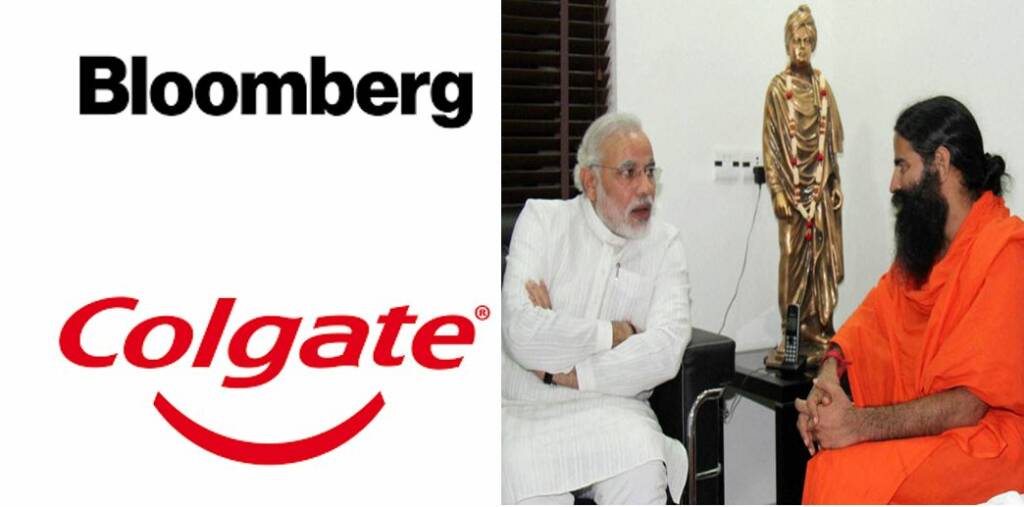Foreign media outlets have been trying to make a case for the ‘end of India story’ for so long, especially after the Modi government came to power. The rise of Modi’s India, which is no longer ready to accept a role of a secondary player in the global power equation, is, not going well with the people who view the world with a colonial mindset. And the media outlets like NYT, WSJ, Bloomberg have been at the forefront of it.
After raising questions over HCQ and Bharat Biotech’s vaccine, and lobbying for the American big pharmaceutical companies, Bloomberg’s columnists are not happy with the stock market index, which is moving north with every passing day.
Andy Mukherjee, the Bloomberg ‘opinion’ writer who wrote the article ‘Why I’m Losing Hope in India’ on 28 November 2020, has now blamed the Modi government for the decline in the sales of Colgate toothpaste. Colgate-Palmolive, a US-based multinational, has been selling toothpaste in India for decades and its flagship brand has been synonymous with toothpaste throughout the country, especially in rural parts.
However, the entry of Patanjali Ayurveda Limited into consumer businesses has hurt the businesses of almost all fast-moving consumer goods (FMCG) companies. The companies like Colgate, whose majority business was based in rural parts, were badly hurt by the entry of Baba Ramdev promoted by Patanjali Ayurveda.
A homegrown company is taking on American multinationals and this obviously did not go well with big media based in the United States and their employees in India. So, Andy Mukherjee wrote an article and tried to paint the sad story of Colgate to explain India’s growth story and rising stock market indexes.
In a story titled ‘Colgate’s numbers may offer some clues into Indian stock market mystery’, Mukherjee wrote, “Scientists are forecasting 1.2 million deaths by end-August, hospitals are running out of beds and oxygen, and bodies are being dumped in the Ganges river, yet the Nifty 50 index is trading at a price-to-earnings ratio of 31. Even after softening somewhat since February, valuations are still rich. In the Asia-Pacific region, only Australia, New Zealand and Singapore are more expensive.”
Mukherjee is not happy with the fact that India’s stock markets are moving northwards, and the investors are bullish about the Indian economy despite the devastating second wave and trying to prove that investors are stupid to invest in Indian companies.
Mukherjee also shows his distaste for India’s traditional methods and homegrown companies in the article. According to Mukherjee, Colgate was doing well in India, “But then came the challenge to its dominance from a yoga guru and his homegrown Ayurveda company, followed by Prime Minister Narendra Modi’s bizarre ban on 86% of cash in 2016, a banking crisis, a brutal economic slowdown, and finally two waves of Covid-19. Colgate hasn’t once managed double-digit growth in the last six years under Modi.”
Previously big business media companies like Bloomberg and Forbes aggressively promoted Remdesivir over HCQ. Bloomberg, the ringleader of the big financial media house, published a story titled “Two-Thirds of Severe Covid-19 Cases Improved on Gilead Drug” on April 11 to promote the anti-Covid-19 drug developed by Gilead Sciences.
On April 10, the same Bloomberg published a story titled, “Malaria Drug Hype Lures Macron as Hope Gets Ahead of Science” mimicking the faith of the French President in the drug that is primarily produced in India.
Later when India’s vaccine showed 80 per cent efficacy, Bloomberg reported on the development in a report titled, ‘Criticized Indian Vaccine Already in Use Found 81% Effective.’ The American media companies are not happy with the AtmaNirbhar Bharat policy of the Modi government, which weakens the hold of American multinationals on the Indian market and these stories are a result of that.
